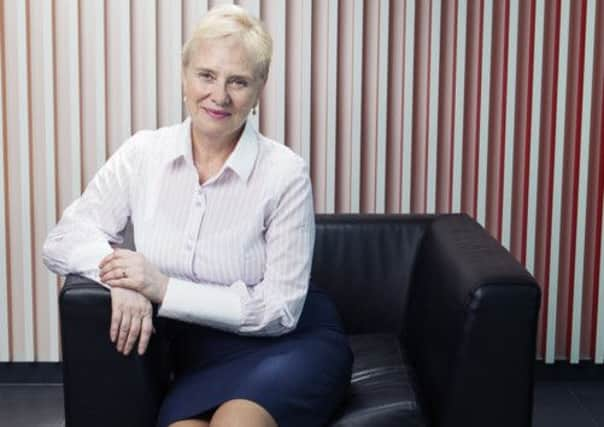Interview: Ann Cairns, Mastercard


Sitting in a corner of the Whisky Bar at Edinburgh’s Balmoral Hotel, Cairns is a mine of information as she explains the new cloud-based payment system that will link mobile phones, tablet computers and banks.
Newcastle-born Cairns became the first woman to work on the North Sea oil rigs when she landed her first job out of university with British Gas. She is now MasterCard’s second in command and expects Britain to be at the forefront of the latest digital revolution.
Advertisement
Hide AdAdvertisement
Hide AdShe says British businesses are already leading the way in digital commerce, while the UK’s relatively consolidated telecoms and banking markets will make negotiations easier.
Cairns, who was in Edinburgh last week to meet with institutional investors, says telecoms groups have been trying to develop a payment system for years, but the stumbling block has been linking into the existing ATM network to allow access to cash. She says: “What we are designing now is a ‘digital wallet’ but not in the old sense – it’s a lot more than that. You can have one-click, one-button payment whether you are on your phone or your iPad.”
Using satellite positioning, consumers could even be directed to shops to see or try on an item.
Crucially, the account would also have a traditional bank card to access cash, which is still by far the most popular method of payment worldwide.
“Ultimately, everything will get mobile, and we’ve signed up most of the major telecoms companies in the world.” MasterCard also has contacts with about 25,000 banks and 35 million points of sale across the globe.
Telecoms firms have been working on payment methods for years. In some parts of the developing world, where there was no bank network in the first place, systems have been developed to make small payments from one mobile phone to another. However, this has only proved popular in a few remote areas, such as rural Kenya.
“In the real world, cash and cards and mobiles all coexist, and the ATM network is not set up to get cash out of a telephone,” Cairns says.
She acknowledges people’s spending plans do not revolve around payment methods. “What people expect is for the payment to be seamless. It’s almost the bit you want to forget about.”
Advertisement
Hide AdAdvertisement
Hide AdThe cloud-based digital wallet could also incorporate advanced security features such as fingerprint or voice recognition. Mobile phone companies and operators have been investing in security, while MasterCard has already developed a biometrics-based card system which is used for benefits payments in South Africa.
A system of pre-paid cards was brought in by the government to combat widespread benefit fraud.
The pre-paid card system is a growth area for MasterCard globally, providing a way for millions of people without bank accounts to access the digital economy. MasterCard splashed out £290 million to buy Travelex’s pre-paid cash-card business in 2010 as it saw the opportunity to win business in fast-growing emerging markets.
MasterCard has also worked with the United Nation’s World Food Programme to create a card system that allows disaster victims and displaced people to buy food from authorised providers. The cards are used in areas where famine is not a result of a lack of food in the area, but in situations such as the refugee camps that have resulted from the civil war in Syria.
It’s a part of her work that Cairns is clearly especially proud of, although the topic has only come up as she lists the potential benefits using digital payments instead of cash. She believes cash, which still accounts for 85 per cent of transactions worldwide, actually costs as much as 1.5 per cent of all economic output just in handling costs. In some countries, the potential benefits of going digital in tackling corruption and tax evasion are greater still.
And although yet to catch on in the UK, pre-paid cards are also popular in some developed countries, where parents use them to pay allowances to their children. They can even be programmed to provide a daily budget or to exclude spending on certain items, such as alcohol.
Cairns says MasterCard’s pre-paid business has been growing by up to 50 per cent a year in some regions. The company – which does not itself provide credit but instead runs the payment methods for banks and other providers – would easily be able to add pre-paid versions of its digital wallet.
Cairns, a qualified statistician, is also acutely aware of the huge amount of information MasterCard is gathering. She says some clients may want to use information on individual customers’ spending habits, but that MasterCard’s interest is in “big data” – the wider statistics, stripped of personal details, which allow trends to be seen.
“I know that when a Japanese person comes to London, they spend the most money in Boots,” she says with obvious delight at the example.